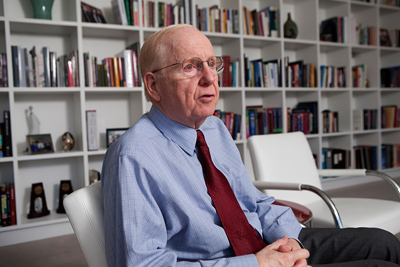Strategic plan to take Cornell to 2015 and beyond
By Susan Kelley

What will Cornell look like in 2015? Edward Lawler and seven other faculty members of the Strategic Planning Advisory Council are drafting a document that will offer some answers.
A new Web site, has a draft of the plan's outline. Lawler, the Martin P. Catherwood Professor of Industrial and Labor Relations and former dean of the ILR School, co-chairs the planning initiative with Provost Kent Fuchs.
Here, Lawler shares some thoughts about the strategic plan that will guide the university into the future.
Strategic plans often end up forgotten in a dusty binder on a shelf. How do you plan to ensure that your work doesn't meet the same fate?
The president and provost are committed to operating with a strategic plan, and we are working to specify actions for each objective. We won't in all cases say exactly what should be done, but we will point in certain directions.
The plan will offer a roadmap for moving the university forward but also will require regular if not continual modifications and adjustments. A good strategic plan is going to be a living, working document, even after it's finished.
What themes are emerging from the planning process?
They include how to promote faculty and staff excellence given intense competition and limited resources; diversity and inclusion; a distinctive education; collaboration across disciplines and colleges; and effective assessments of teaching, research and outreach.
We're looking at the university as a whole, and thinking of Cornell as a singular unit, while recognizing and affirming the importance of strong and distinctive colleges and other academic units.
What is the difference between the strategic plan and "Reimagining Cornell"?
The strategic plan is a component of Reimagining Cornell. It contains the aspirational, future-oriented thinking about what goals or objectives we should work toward and how we should try to achieve them in the next five years, in the context of the university's longer-term challenges and opportunities.
Don't we already have a strategic plan?
There is a strategic plan, from 2008, on the president's Web page. It's one of several background documents for us. We will draw on elements from that plan, but the environment has changed enough that some parts of that plan are outdated.
The Strategic Planning Advisory Council is receiving input and ideas from four working groups, composed of 63 faculty, staff and students. What have they been working on?
In October the provost created the council and the working groups, each of which explored one of the university's broad goals: education; research, scholarship and creativity; public engagement; and organizational stewardship. The council gave each group initial issues to address, and the groups provided input on those and others they deemed important in December. Then the council created an initial draft of objectives and actions for each goal. After additional feedback from working groups and university leaders, we prepared the draft outline.
When will the strategic plan be released?
We will distribute a complete outline for comment in March. The final plan is scheduled for completion in May.
The council will hold a public forum Feb. 24 and brown bag lunch March 3. Will community input really effect significant change in the plan?
We will take comments and suggestions seriously and work to improve the plan on that basis. We have gotten a lot of feedback to date, but over the next month I bet we'll hear things that we haven't heard or thought of and get good ideas for what we need to work on or clarify.
The plan is about the university as a whole, and this is the chance for the university community to give us their input.
Media Contact
Get Cornell news delivered right to your inbox.
Subscribe